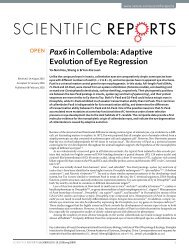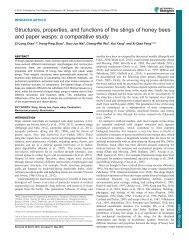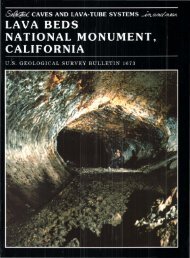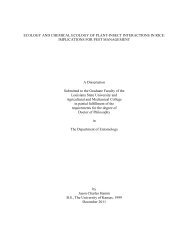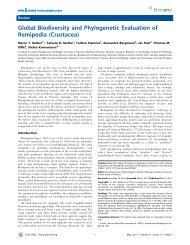Create successful ePaper yourself
Turn your PDF publications into a flip-book with our unique Google optimized e-Paper software.
11. PHYLOGENY: EVOLUTION 95<br />
11<br />
Phylogeny: Evolution<br />
As has been foreshadowed in Chapter 2, the evolutionary problems<br />
which the <strong>Arachnida</strong> pose are unusual in character and difficult to<br />
solve, for the class is one of which the origin is uncertain and within<br />
which the succeeding, progressive, changes are obscured. With as many<br />
as 17 reasonably well defined and recognizably different orders, an<br />
arrangement in a series of ascending steps from the earliest and most<br />
primitive to the latest and most elaborate ought not to be impossible,<br />
yet, in fact, it is.<br />
The chief difficulty lies in the nature of the palaeontological record,<br />
which does not present us with a series of fossils, dated, at least in relation<br />
to each other, by the strata in which they have been found.<br />
An arachnologist's first concern is with the Silurian period. Its<br />
predecessor, the Ordovician, had been marked by a great increase in<br />
the number ofliving things and simultaneously in the appearance of new<br />
species. This was particularly true of the marine invertebrates, the land<br />
being occupied only by plants and probably no insects. The Silurian<br />
rocks were mostly deposited in the littoral and shallow waters of the<br />
seas, and they show us how the evolution of the animal kingdom continued<br />
with undiminished vigour. The seas were populated by Eurypterida<br />
(Fig. 26), which now began to reach the great size for which<br />
they are notorious; Xiphosura such as Hemiaspis abounded, and the<br />
Ostracoderms foreshadowed the arrival of the vertebrates.<br />
It was during this period that the scorpions appear to have left the<br />
water and established their claim to have been the animals that began<br />
the colonization of the land. They are usually regarded as descendants<br />
from an eurypterid stock, and perhaps they were driven to their momentous<br />
experiment by the rigours of life in the Silurian seas. Overcrowding<br />
invariably leads to a state of pollution, such as we know only too well<br />
today, and in general provokes a reaction which takes the form of<br />
emigration. But whatever the stimulus and whatever the conditions of<br />
survival, the order of scorpions has been consistently separated from the<br />
FIG. 26. Ewypterus fisheri. After Holm.<br />
other orders since the time of Ray Lankester's classification in 1905.<br />
These pioneer scorpions may have been able to survive the traumatic<br />
change of environment because of their chitinous exoskeleton, which<br />
retarded the loss of water from the body and prevented a fatal desiccation<br />
which even today is a constant danger to all land Arthropoda. The<br />
necessary alteration of the respiratory system was relatively uncomplicated,<br />
for book-gills which developed a covering would thereby be<br />
converted into book-lungs. The close histological resemblance between<br />
the gills of king crabs and the lungs of scorpions supports this idea. Two<br />
points, however, remain to be considered.<br />
The first is the revolutionary hypothesis, put forward by Versluys<br />
and Demoll ( 1922), that the terrestrial scorpions were the first of the<br />
Chelicerata and were the ancestors of the aquatic Eurypterida and their<br />
allies.<br />
The second point is the undeniably close resemblance between<br />
Palaeophonus, the Silurian scorpion, and its modern counterparts.<br />
True there is a peculiar difference in the ends of the tarsi, but a part from<br />
this the earliest scorpions have the large well-formed chelicerae, the<br />
segmented opisthosoma in which mesosoma and metasoma are clearly




